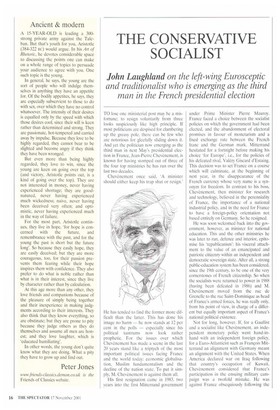Ancient & modern A 15-YEAR-OLD is leading a 300 strong private
army against the Taleban. But that's youth for you, Aristotle (384-322 BO would argue. In his Art of Rhetoric, he devotes considerable space to discussing the points one can make on a whole range of topics to persuade your audience to agree with you. One such topic is the young.
In general, he says, the young are the sort of people who will indulge themselves in anything they have an appetite for. Of the bodily appetites, he says, they are especially subservient to those to do with sex, over which they have no control whatsoever. The intensity of their desires is equalled only by the speed with which those desires cool, since their will is keen rather than determined and strong. They are passionate, hot-tempered and carried away by impulse. Because they love to be highly regarded, they cannot bear to be slighted and become angty if they think they have been wronged.
But even more than being highly regarded, they love to win, since the young are keen on going over the top (and victory, Aristotle points out, is a kind of going over the top). They are not interested in money, never having experienced shortage; they are goodnatured, never having experienced much wickedness; naive, never having been deceived very often; and optimistic, never having experienced much in the way of failure.
For the most part, Aristotle continues, they live in hope, 'for hope is concerned with the future, and remembrance with the past, and for the young the past is short but the future long'. So because they easily hope, they are easily deceived; but they are more courageous, too, for their passion prevents them fearing while their hope inspires them with confidence. They also prefer to do what is noble rather than what is in their interest, since they live by character rather than by calculation.
At this age more than any other, they love friends and companions because of the pleasure of simply being together and their inexperience in making judgments according to their interests. They also think that they know everything, so are obstinate; but they are prone to pity because they judge others as they do themselves and assume all men are honest; and they love laughter, which is 'educated humiliating'.
In other words, the young don't quite know what they are doing. What a pity they have to grow up and find out.
Peter Jones
www.friends-classics.demort.co.uk is the Friends of Classics website.






















































































 Previous page
Previous page